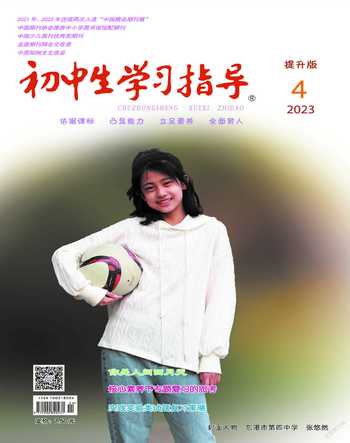中考热考具有两种形式的副词
2023-04-17吴新桂
吴新桂
英语中,有些副词有两种形式,如late和lately,一种和形容词形式完全相同,另一种以-ly结尾。一般说来,这两种形式的副词在意义上区别不大。如:
He held his son’s hand firmly to be sure that the boy didn’t bow, either.
他紧握儿子的手,以确保孩子也不鞠躬。
这里的firmly也可换成firm,而且意思区别也不大。类似的副词还有tight与tightly,first与firstly等。
但是,在实际运用中,情况并非全都如此。有些具有两种形式的副词在句中表达的含义和用法却不相同,这是值得注意的。如hard 和 hardly。
hard,hardly 两者虽然只有-ly之差,意义却大不相同。hard表示“辛苦,使劲,努力”。如:He works very hard. (他学习非常努力。) 而hardly为否定副词,表示“几乎不”。如:The box is so heavy that he could hardly carry it. (这箱子是那么沉,他几乎搬不动。)
下面再精选几组中考热考的具有两种形式,但是意义差别很大的副词,供同学们参考。
1. late迟到;lately最近
You have come too late. 你来得太晚了。
Have you see him lately? 你最近见到过他吗?
2. pretty = very非常;prettily漂亮地
The exam was pretty difficult. 这次考试相当难。
The little girl is always prettily dressed.
这个小女孩总是穿得漂漂亮亮的。
3. close(具体距离上的)接近地、紧挨地;closely(抽象)亲密地
They sat close together. 他们紧挨着坐着。
Who is closely to you, your mom or your dad?
谁跟你最亲近,你的妈妈还是爸爸?
4. high(具体高度)很高地;highly(抽象)高度地、赞赏地
The kites fly high in the sky. 这些风筝在天空飞得很高。
His teachers think very highly of him.
(老师们很欣赏他。)老师们对他评价很高。
5. wide具体距离很宽;widely广泛地
The door was wide open. 门被开得大大的。
We were widely different on many questions.
我们在许多问题上分歧很大。
6. deep多用于具体的、有形的场合; deeply多用于抽象的或比喻的场合,意为“深刻地;强烈地”。
They had to dig deep to find water. 他们必须挖得很深才能发现水。
He pushed the stick deep into the mud. 他把木棍深深地插进泥浆里。
We love our motherland deeply. 我们深深地热爱我们的祖国。
Karen and Dave are deeply in love with each other.
凯伦与戴夫两人深深地相爱着。
注意以下几个搭配:
deep into the night到深夜
deep in reading a book 专心致志地读书
deep in work(study, thought) 埋头工作(学习,沉思)
7. just作副词用时,意为“正是、就是、刚才、简直太”; justly作副词用时,意为“公正地、合理地、公平地”。
This is just what I want. 这正是我想要的。
He was justly punished for his crimes. 他犯了罪,理應受到惩罚。
8. near作为副词,意为“离……不远、近邻”; nearly作为副词,意为“几乎、差不多、将近”。
The train came nearer and nearer. 火车越来越近了。
The child slipped and nearly fell. 孩子滑了一下险些摔倒。
